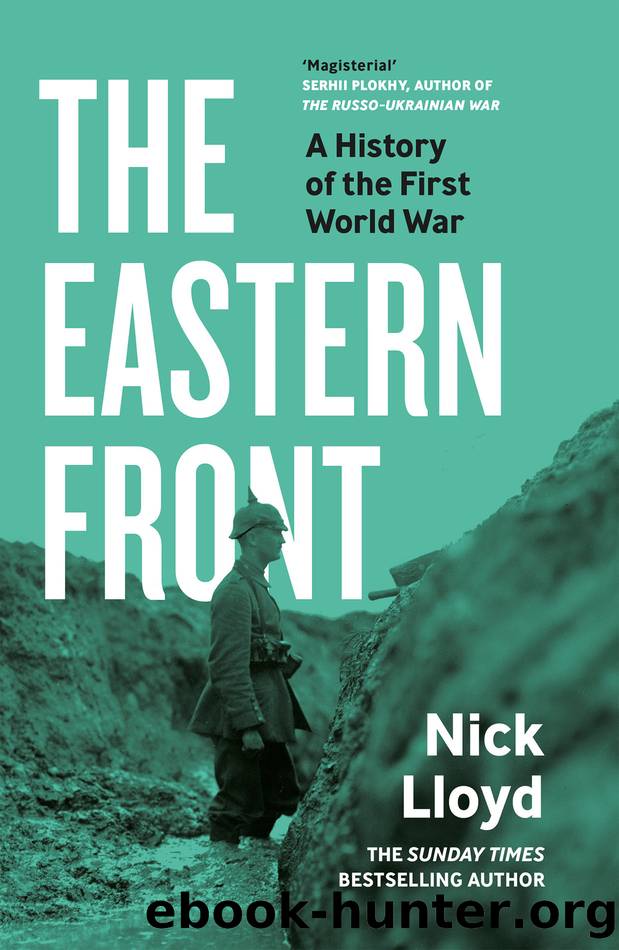The Eastern Front: A History of the First World War by Nick Lloyd

Author:Nick Lloyd [Lloyd, Nick]
Language: eng
Format: epub
Tags: History, Wars & Conflicts, World War I, Military, General, Europe, Eastern
ISBN: 9780241992104
Publisher: Penguin
Published: 2024-03-27T19:00:00+00:00
The responses, received an hour or two later, all favoured abdication. From the Caucasus, Grand Duke Nikolai Nikolaevich urged the Tsar âon my knees to save Russia and your heir, knowing as I do the feelings of sacred love you bear towards Russia and himâ. At Western Front, General Evert implored Nicholas to âsave the Fatherland and the dynastyâ by acting âin accordance with the declaration of the President of the State Dumaâ. Likewise, Brusilov, at Southwest Front, was equally forthright. âPlease submit to the Emperor my loyal petition ⦠that he renounce the throne in favour of His Highness the heirâ.46
The loss of his generalsâ confidence was devastating for the Tsar. He read the telegrams shortly before three oâclock that afternoon. Smoking continuously and occasionally getting up to look out of the window at the snowy ground outside, he told Ruzski that he had been âborn for misfortuneâ.47 He then signed the abdication manifesto, his hands shaking slightly, all the energy and vigour drained out of his face. âIn the midst of the great struggle against a foreign foe, who has been striving for three years to enslave our country, it has pleased God to lay on Russia a new and painful trial.â What Nicholas called ânewly arisen popular disturbancesâ now threatened the successful prosecution of the war, and to âhelp our people to draw together and unite all their forcesâ, he had agreed to âlay down the Supreme Powerâ. In direct contravention of the Law of Succession, which specified that the throne would pass automatically to the next male heir, he had decided that he could not be parted from his son, Alexis, and that he would hand it to his brother, the Grand Duke Mikhail Alexandrovich. But the Grand Duke reacted with horror when he was told the news and quickly divested himself of the responsibility, hurriedly issuing a statement confirming that he would only accept the âsupreme powerâ âif that be the desire of our great peopleâ expressed at a general election. In the meantime, he urged his fellow countrymen to âsubject themselves to the Provisional Government, which is created by and invested with full power by the State Dumaâ.48
It was done. What had started as a series of demonstrations about bread had turned into a raging torrent of anger and violence that had overturned one of the most enduring royal dynasties in the world. The Tsar had always struggled in his role, despising the idea of a constitutional monarchy, yet lacking the fierce and brutal determination of an autocrat (at least when compared with those that came after him). Nicholas de Basily, director of the Imperial Chancellery at Stavka, was astonished at his demeanour throughout the crisis. âHe accepted fate without the least revolt, without the least show of anger or ill humor, without the least reproach to anyoneâ, he remembered. âThis man, who on so many occasions had seemed to us to lack will, had made his decision with great courage and dignity, without hesitation ⦠According to the English expression, he knew how to lose.
Download
This site does not store any files on its server. We only index and link to content provided by other sites. Please contact the content providers to delete copyright contents if any and email us, we'll remove relevant links or contents immediately.
The Radium Girls by Kate Moore(12013)
100 Deadly Skills by Clint Emerson(4917)
Rise and Kill First by Ronen Bergman(4776)
The Templars by Dan Jones(4681)
The Doomsday Machine by Daniel Ellsberg(4483)
The Rape of Nanking by Iris Chang(4200)
Killing England by Bill O'Reilly(3994)
Stalin by Stephen Kotkin(3956)
Hitler in Los Angeles by Steven J. Ross(3940)
12 Strong by Doug Stanton(3541)
Hitler's Monsters by Eric Kurlander(3327)
Blood and Sand by Alex Von Tunzelmann(3192)
The Code Book by Simon Singh(3175)
Darkest Hour by Anthony McCarten(3117)
The Art of War Visualized by Jessica Hagy(3000)
Hitler's Flying Saucers: A Guide to German Flying Discs of the Second World War by Stevens Henry(2744)
Babylon's Ark by Lawrence Anthony(2671)
The Second World Wars by Victor Davis Hanson(2521)
Tobruk by Peter Fitzsimons(2504)
